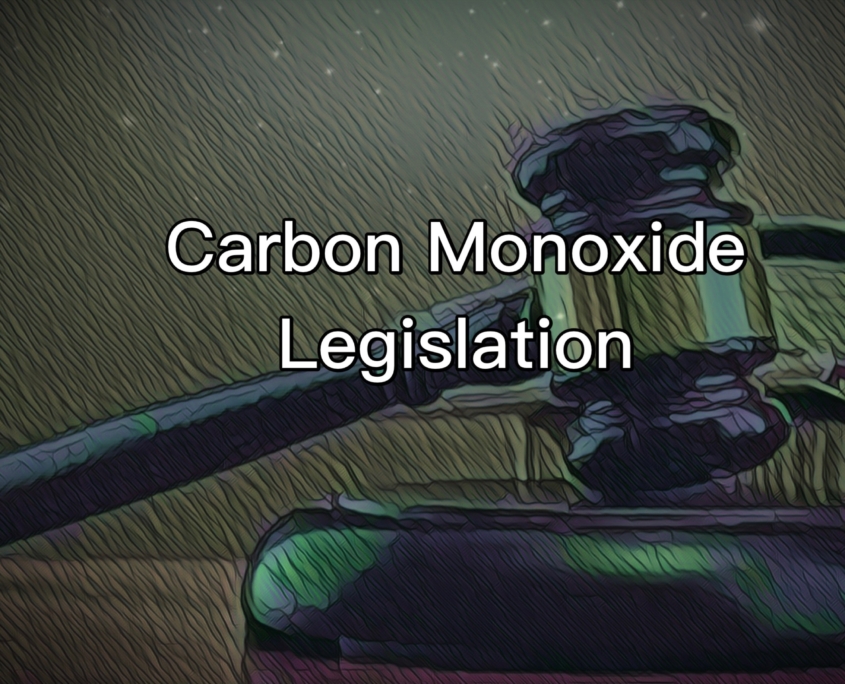Now is the Time for Effective Carbon Monoxide Detector Laws
Carbon monoxide detector legislation is the only way to cut down on deaths and injuries from carbon monoxide poisoning, yet legislation still lags.
By Rebecca Martin
The carbon monoxide detector, developed in 1925, has been part of the safety technology scene for almost a century. In our recent blogs we have looked at cases of carbon monoxide poisonings and deaths which could have been prevented if carbon monoxide detectors had been in use. The main reason they were not utilized as a preventative measure was entirely due to lack of legislation requiring their use. In the La Grange, KY hotel poisoning case, state laws did not require carbon monoxide detectors in hotels and motels. In the Cambridge Commons Residence Hall at UWM in Milwaukee, WI, detectors weren’t specifically required in the dormitory environment.

Legislation for carbon monoxide detector requirements is still lagging while avoidable deaths and injuries keep occurring as a result.
We are seeing more and more warnings on the consumer side. Generators have been required to have warning labels regarding their potential to cause carbon monoxide poisoning since 2007, even though experts warn that the problem is bigger than user error.
“Industry regulations, and manufacturers themselves, could make portable generators a lot safer.” Fred Henretig, Senior toxicologist at the Poison Control Center at the Children’s Hospital of Philadelphia https://www.npr.org/2019/12/04/784279242/carbon-monoxide-poisoning-from-portable-generators-proves-predictable-and-deadly
Though many of the culprits in carbon monoxide poisonings are receiving scrutiny over effective warnings for their use, many other sources of carbon monoxide poisoning have slipped through the cracks over the years. This is evident in the lack of adequate legislation involving various types of lodging. It is agreed that one is most at risk when in the most vulnerable state, sleep. To date, only 14 states require carbon monoxide detectors in hotels and motels. In some cases that legislation has not been adequately legally interpreted in instances of other forms of lodging.
Hotel Carbon Monoxide Detector Rules Have Gone Backwards
This was not always the case as in 2015 new codes went into effect which eliminated a 2012 requirement that there should be a carbon monoxide detector in each room and common area in a hotel or motel. These international fire and building codes are the basis by which states and municipalities determine their individual legislative actions.
“From 2005-2018, Hauschildt and her co-researchers, Neil B. Hampson, Kayla Deru, and Lindell Weaver found 905 hotel guest poisonings and 22 deaths, with 27% of those being children.” https://www.forbes.com/sites/judystone/2020/01/09/hotelsa-hidden-source-of-carbon-monoxide-poisoning/?sh=303de6f458cb
REM Risk Consultants maintains a map of hotel carbon monoxide incidents at https://remrisk.com/2019/10/21/rem-develops-interactive-hotel-carbon-monoxide-map/
In states which require carbon monoxide in lodging facilities there are additional issues which need to be addressed. One issue is that there is often no infrastructure in place to inform those in the hospitality industry of the state or municipal requirements. Another issue is that hotel owners and staff are not educated or trained in the use of carbon monoxide detectors even if they are present. A non-functioning carbon monoxide detector is no more useful than the absolute absence of a detector at all.
“There are currently no requirements for carbon monoxide education and/or training of hotel owners and staff.” https://remrisk.com/2019/10/21/rem-develops-interactive-hotel-carbon-monoxide-map/
Hotel incidents of carbon monoxide poisonings and fatalities continue to occur and little has been done to address the gap in legislation, until now. We wrote in depth about the Boone County North Carolina hotel poisonings which took the lives of an elderly couple and a young boy. The deaths were caused by a faulty pool heater which also played a role in several reports of carbon monoxide symptoms. The surviving family members have become advocates for carbon monoxide detectors in the hospitality industry.
New Code Will Bring Change But…
Kris Hauschildt lost both of her parents in the North Carolina hotel and has been instrumental in working with the establishment of new International Code requirements which will require carbon monoxide detectors in all new and existing public buildings which utilize any type of fuel-burning device. This would include not only boilers, pool heaters, and hot water heaters but also fireplaces and gas stoves. These new codes go into effect in 2024 and will require that all hotels, motels and other lodging establishments have carbon monoxide detectors in place.
“Hauschildt said detectors should have been required all along.” https://tdn.com/news/local/crime-and-courts/longview-woman-helps-change-international-fire-code-to-ensure-more-co-alarms-in-public-buildings/article_bbf48177-8782-59d6-a0a2-9c7f3b1abdbd.html
Even so, it will take years for the individual State Legislatures to write the modified International Codes into law.
“Each state has individualized statutes based on the International Fire Code — a set of minimum requirements that are updated every three years to protect people from hazards like fires and carbon monoxide poisoning.” https://tdn.com/news/local/crime-and-courts/longview-woman-helps-change-international-fire-code-to-ensure-more-co-alarms-in-public-buildings/article_bbf48177-8782-59d6-a0a2-9c7f3b1abdbd.html
Carbon Monoxide Detector Rules for Schools?
This article from tdn.com goes on to point out that only five states require carbon monoxide detectors in schools. That is a fact it is difficult to wrap one’s head around. As we said at the beginning, carbon monoxide detectors have been around for almost a century, and they won’t be required in all public buildings universally until well into their second century. We have become so accustomed to the requirement for smoke detectors in public buildings, how many of us assume that carbon monoxide detectors are already in place? There seem to be numerous articles which urge travelers to carry portable detectors as a precaution. But once again, this places the burden for safety on the consumer while exempting the provider from taking necessary and ethical precautions.
In April of 2021 the House passed H.R. 1460, the Nicholas and Zachary Burt Memorial Carbon Monoxide Poisoning Prevention Act “ which was introduced by Reps. Annie Kuster (D-NH) and Earl L. “Buddy” Carter (R-GA) to create a new grant program to install carbon monoxide alarms in the homes of elderly and low-income individuals, as well as schools and other public facilities. The Carbon Monoxide Poisoning Prevention Act also provides incentives for states to pass laws to require CO alarms.“ https://kuster.house.gov/news/documentsingle.aspx?DocumentID=3486
The status of this bill is viewable at https://www.congress.gov/bill/117th-congress/house-bill/1460/actions The latest action is that it has been referred to the Committee on Commerce, Science and Transportation. To proceed into law it must pass the Senate, and be signed by the President.
Why does it Take More Deaths To Motivate Change?
The bill is named for two brothers who died of carbon monoxide poisoning in 1996 in Rochester, MN. Todd Burt, his wife Cheryl and his oldest son survived a carbon monoxide incident that took the life of their four-year-old and 16-month-old son while they slept.
“Just before Christmas, Cheryl had thought about buying a carbon monoxide alarm. Instead, she used the money to buy her son Nicholas a toy truck.” Cheryl says, “We didn’t buy a carbon monoxide detector; we didn’t have one up; we could have; we should have.” https://www.cbsnews.com/news/dont-be-poisoned-at-home/
We could have, we should have. All too often those words follow an incident of carbon monoxide poisoning. Whether is a poisoning in a residence, or a hotel, or even residence hall. And often the catalysts for a change in our laws are the surviving family members themselves. It is a terrible fact of life that often change is too slow to save those we care about. Maybe someday in the not too distant future we will see meaningful legislation passed to prevent these tragedies from happening. And yet the question still sits there; why do we have to have a law to perform such a simple task as installing carbon monoxide detectors in situations where people are vulnerable to carbon monoxide? How many preventable tragedies need to happen?

Leave a Reply
Want to join the discussion?Feel free to contribute!